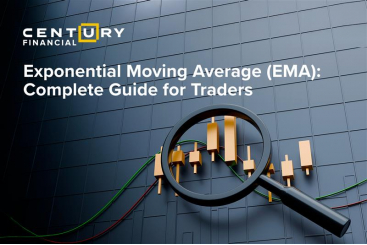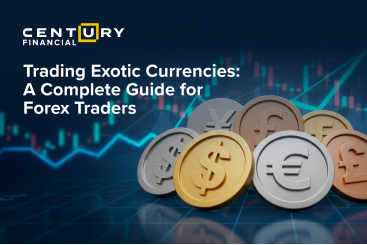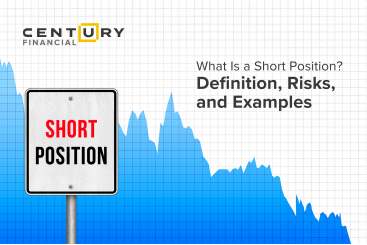Monday, March 20, 2023
Thinking of timing the market? 7 reasons you shouldn’t
By Century Financial in 'Blog'

.jpg)
There is a chance you may have heard this from a trader or investor saying, “I timed the market perfectly”. In investing, there are many that look to ‘time the market’ in an attempt to gain the maximum of their investments.
But does timing the market really work? So, let’s understand it more by first understanding what it means.
Timing the market
It is an approach where an investor waits for the best time to open or close a trade in the expectation of receiving the highest returns.
Investors who participate in such trades don’t enter the market when they have money to trade. Instead, they are more inclined to keep the money as cash and wait till when they believe it is the right time to enter the stock market.
For such traders, the right time to enter a trade is either at the end of a bear market or the beginning of a bull market, as they can go long on stock CFDs at the lowest possible price in a bear market while going short on the maximum price in a bull market.
But does it really work?

It is pertinent to remember that market timing is one of many strategies used during stock market open time. Other strategies, include passive investing, which involves systematic investments in indices or ETFs without having any regard for market timing and relying on long-term success.
Simply put, timing the market is a risky proposition. William Sharpe, a Nobel Laureate, in 1975, in his trailblazing study, revealed that for an investor to time the stock market, he needs to be accurate 74% of the time compared to a passive investor with a similar risk profile. And it wasn’t just Sharpe, Morningstar did similar research and found that investors need to be accurate 70% of the time.
The truth is even for advanced traders that are educated, knowledgeable and have tonnes of experience, timing the market is a difficult task.
So here are seven reasons why you shouldn’t look to time the market.
Missing out on the best-performing days
When marketing timing goes wrong, it can be disastrous for an investor. To put it in perspective, the trader might risk being out of the market for a day, week or even a month. However, when an investor is invested in a stock for the long term, they get consistent returns and are entitled to annualized returns.
Thus, in many ways, investors who are in the stock market are never likely to miss out on the stock’s successful days, while those who practice market timing may end up being left out of the stock’s upward trends.
Missing out on compounded returns
What’s more, investors who time the market are likely to also miss out on the compounding returns. This occurs when the money that is invested earns interest, and subsequently, the interest earns interest. Plus, such not only miss out on compounding and its benefits but also their money losses value during an inflationary period.
Waiting for the price to drop further
In all likelihood, you would have come across the term “buying the dip.” It means waiting for a stock to reach its lowest point before buying it. But in reality, no one really knows when a market or a stock has reached rock bottom, and many investors learn that the supposed lowest point was just the beginning, leading them to lose a lot more.
Let emotions come in the way
When an investor times the market, they are constantly taking a look at stock tickers, and in due course of time, get emotionally invested in the market’s short-term volatility. Such emotionally attached short-term thinking occurs due to fear and greed, which could lead them to enter a market when the dip has just begun or exit a market when the bull run is about to intensify.
Higher costs
This one is quite obvious, but those who time the market are likely to execute more transactions compared with those who follow a long-term investment strategy. Thus, more transactions will mean more costs.
Wasting time and energy
For any investor, advanced or novice, attempting to time the market can be time-consuming and stressful. Consider the things involved, research, technical analysis, charts etc. So think before you take a dive into timing the market.
Not getting the benefit of a bearish market
Those investors that choose to be a part of the market in the long term can make profits even during a bearish market. After all, there are opportunities to buy good stocks at a low price and make a considerable profit.
When it comes to investing, accurately pinpointing when the market is at its highest or at its lowest can be difficult. That is why as an investor, it is some prefer to have a passive investment strategy instead of timing the market.
This marketing and educational content has been created by Century Financial Consultancy LLC (“Century”) for general information only. It does not constitute investment, legal, tax, or other professional advice, nor does it constitute a recommendation, offer, or solicitation to buy or sell any financial instrument. The material does not take into account your investment objectives, financial situation, or particular needs.
The opinions expressed by the hosts, speakers, or guests are their own and may change without notice. Information is based on sources we consider to be reliable; however, Century does not guarantee its accuracy, completeness, or timeliness and accepts no liability for any loss arising from reliance on this content.
Trading and investing involve significant risk, and losses may exceed initial deposits. Past performance is not indicative of future results. CFDs and other leveraged products are complex instruments that may not be suitable for all investors. Please ensure you understand how these products work, the associated risks, and seek independent professional advice if necessary.
Century is licensed and regulated by the UAE Capital Market Authority (CMA) under License Nos. 20200000028 and 301044.
Please refer to the full risk disclosure mentioned on our website.




__1439480927.jpg)




.png)
.png)
.png)
.png)


